Written by Lily Haines (PIMS) & Natalia Hurtado (The Island School & PIMS)
Coral reefs are among the most diverse ecosystems on earth and the lifeblood of The Bahamas’ blue economy. Valued at up to USD 135 million per square kilometre, these underwater rainforests shelter thousands of marine species; from extraordinary sharks and rays, to world-renowned delicacies like the Caribbean spiny lobster and the Nassau grouper.
But it’s no secret that coral reefs in The Bahamas have been decimated over the last half century, largely because of climate change, coral disease, pollution and local threats such as overfishing and industrial development. Major reef building coral species that were once common across the nation’s turquoise blue waters have been reduced to endangered or critically endangered species and many are reproductively isolated to the point where natural recovery can no longer occur.

Not a nation to sit idly by however, the launch of the Reef Rescue Network (RRN) in 2017 has distinguished The Bahamas as a global leader in coral restoration. Recent advances in coral restoration have provided scientists with the ability to increase biomass of coral species rapidly, and even translocate corals to promote genetic exchange to allow for reproductive success. Using these novel methodologies, the Reef Rescue Network has paved the way for Bahamian scientists, conservation managers, tourism operators and the public to take action to restore the coral reefs across the country.
How it works
Among the largest coral restoration initiatives in the Caribbean, the Reef Rescue Network is a country-alliance to fight back against climate change and coral disease by planting new corals in a scientifically sound way. Created in 2017 by the Perry Institute for Marine Science – a non-profit science organization that has trailblazed ocean research, conservation and education for more than 50 years – the Network aims to scale up coral restoration in The Bahamas by engaging key stakeholders in coral restoration activities, including conservation and education organizations, dive operators and resorts.

Through this partnership, the Reef Rescue Network not only increases coral restoration efforts beyond what a single organization can do, including monitoring and evaluation of restoration activities, but provides education and outreach to local and international audiences. To date, this project has trained over 80 Bahamians as Reef Rescue Divers and 0ver 70 Reef Rescue Diver instructors in The Bahamas. Because many partners in the Reef Rescue network are Dive Operators that make significant contributions to the Bahamian Economy but have been hit hard by the COVID pandemic and associated travel restrictions, the Bahamas Ministry of Tourism has become active in promoting the Reef Rescue Network and promoting The Bahamas as a dive destination for coral restoration.

To date, the Network consists of more than 20 partners in The Bahamas doing coral restoration at nearly 30 locations. The Reef Rescue Network has since expanded to two additional Caribbean nations – Aruba and St. Lucia. At present there are nearly 8,000 corals being grown in RRN nurseries and over 2,000 corals have been planted onto degraded reefs.
Coral Restoration in Eleuthera
On Eleuthera, both The Island School and Valentine’s Dive Resort have taken up the coral restoration mantle and joined the Reef Rescue Network’s fight to save coral reefs. Hands-on experiences and the chance to be involved in a coral restoration project is crucial to understand and support the ongoing efforts to save our coral reefs. In South Eleuthera, The Island School combines research with education, actively involving staff, local youth, visiting Semester students and school groups and our Deep Creek Middle School students.
Participants enrolled in the Reef Rescue course, gained valuable hand-on restoration experience and had an unique opportunity to learn outside the walls of the classroom, which gave them a better understanding and connection with their local environment, guided by the Reef Rescue Instructor Natalia Hurtado, lead scientist of the Bahamas Coral Innovation project at The Island School’s Cape Eleuthera Institute.

An Island School staff member learns how to remove sediment and algae from a coral nursery tree.
One of the most important parts of the work in the Coral Hub is building awareness in younger generations about the importance of coral reefs and encouraging them to share their knowledge. During the reef rescue course, students learned about coral nurseries, including essential facts about coral reefs, threats facing corals, how coral nurseries function and how to maintain coral nurseries. Once they complete their course, they are ready to help maintain the biggest coral nursery of our Reef Rescue Network in The Bahamas, located in South Eleuthera or they can volunteer and visit other nurseries within the network.
No Permits, No Progress: Taking Action to Save Coral Reefs in The Bahamas
Unfortunately, for more than a year, the Department of Environmental Protection and Planning has effectively stopped coral restoration in Eleuthera and across The Bahamas due to the Biological Resources and Traditional Knowledge Protection and Sustainable Use Act, 2020, which came into effect just over a year ago. The intent of the new law was to protect the country’s natural resources, ensuring it wouldn’t be exploited by foreign interests under the guise of research. However, it had an unintended consequence, suspending the work of world class scientists from renowned institutions like the Cape Eleuthera Institute and the Perry Institute, who sought to help Bahamians and businesses rebuild and rehabilitate underwater habitats while they study the marine ecosystems here. Aside from negatively impacting both local and foreign scientists across the board, the permit crisis is also severely hindering Bahamian graduate students engaged in research to fulfill requirements for their degrees.
While the Network and its partners have continued to maintain their growing coral nurseries in Eleuthera, planting new corals to expand healthy coral communities has come to a complete stop. If not approved right away, the Network stands to lose over $1 million USD in direct foreign investment. These funds are meant to expand the network in The Bahamas and create a larger dive tourism market. Given the current outbreak of Stony Coral Tissue Loss Disease on reefs throughout The Bahamas, this work is critical to ensuring the health of local coral reef ecosystems and fish habitats.

Show your support for the Reef Rescue Network’s scientific permit directly to your own Member of Parliament by filling out the form available here. We’ll send you more information on how you can take immediate action. Let’s foster an ocean of change, together!
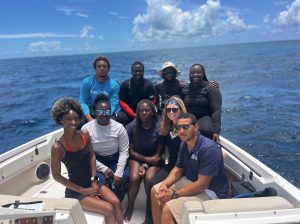
Become a PADI Dive Instructor in The Bahamas | Conservation-Focused IDC
Become a PADI Dive Instructor in The Bahamas | Conservation-Focused IDC | Perry Institute for Marine Science Education & Training Ready to take your diving skills to the next level
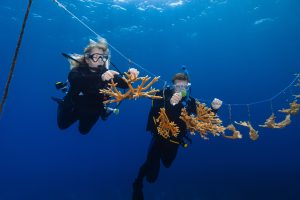
Stream2Sea Coral Care: The World’s First Reef-Positive Sunscreen
Stream2Sea Coral Care: The World’s First Reef-Positive Sunscreen | Perry Institute for Marine Science Conservation Partners Stream2Sea Coral Care: The World’s First Reef-Positive Sunscreen Discover why PIMS has partnered with

Build a Coral Reef for the Holidays | PIMS x Partanna
PIMS is partnering with Partanna to build a 100m² carbon-negative reef. Rick Fox is matching donations up to $25k. Help us build a sanctuary for the future.
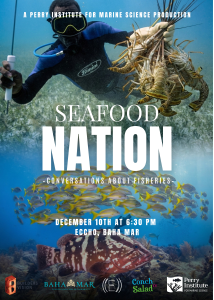
“Seafood Nation” Documentary Premiere Explores the Heart of Bahamian Culture and the Future of Fisheries
NASSAU, The Bahamas | December 5, 2025 – From the bustling stalls of Potter’s Cay to family kitchen tables across the archipelago, seafood is far more than just sustenance in
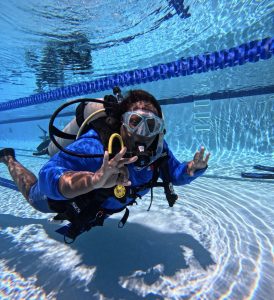
PIMS and Disney Conservation Fund Partner to Train 19 Government Divers
PIMS dive training in Nassau strengthened national coral restoration capacity across government agencies. Bahamas Dive Training Builds National Coral Restoration Capacity Last fall, between the months of September and October,
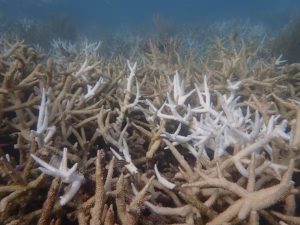
Florida’s Coral Reef Crossed a Line: What Functional Extinction Really Means for Elkhorn and Staghorn Corals
Reefs didn’t just bleach. They functionally vanished in one summer. A new Science study co-authored by researchers from the Perry Institute for Marine Science (PIMS) has found that Florida’s two


